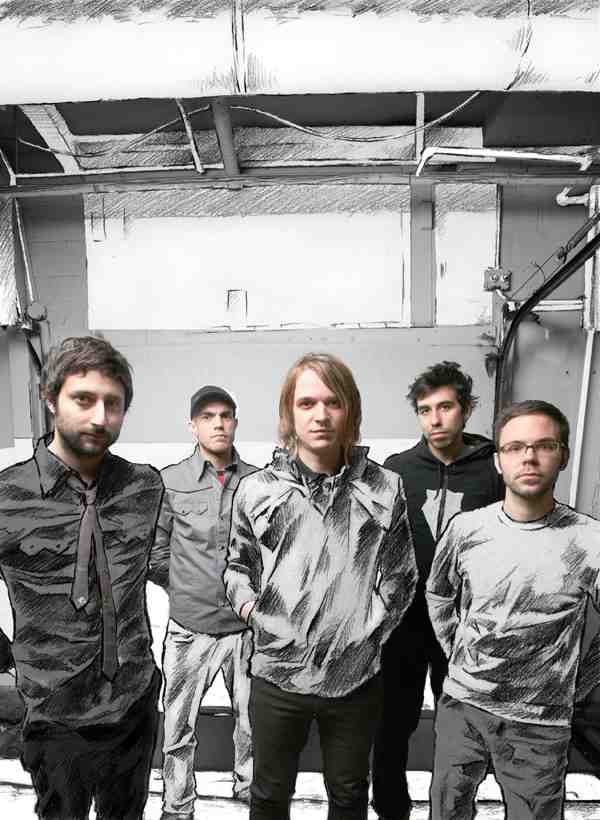By Karen Bliss

Karkwa, 2010’s Polaris Music Prize winners, will screen a documentary at U of T on Sunday, Sept.18. Courtesy Karkwa.
Francophone indie rock act Karkwa had little presence outside its native Quebec when its fourth album, Les Chemins de Verre, was selected as winner of the 2010 Polaris Music Prize—a $20,000 cheque that went to the year’s Best Album, as determined by media from across the country.
The award landed the band immediate attention in English-speaking Canada, and coverage in top publications NME, Rolling Stone, Huffington Post, The Guardian, Los Angeles Times, and Billboard.
“We sell a lot of albums during the two or three weeks after winning the prize outside of Quebec, in all the provinces in Canada,” said the band’s French-speaking manager Sandy Boutin. “The Polaris have a big impact and it have a big impact too on our sales in Quebec. Quebec we are really not huge, but everybody know about Karkwa. Our last album Le volume du vent, we sold 30,000 copies only in Quebec and with Polaris all the Anglophone media talk about Karkwa after winning the prize.”
As the next Polaris ceremony takes place on Sept. 19 with a private gala at the Masonic Temple, Karkwa will be in Toronto, as it crosses the country on its first headlining tour. The band’s concert at Lee’s Palace (529 Bloor St. W.) is Sept. 17 and the five-piece band will stay in the city to present the cheque (this time $30,000) to the 2011 Polaris winner.
A day after the concert, there is also a screening of Les Cendres de Verre, the art-documentary for Karkwa’s fourth album, Chemins de Verre, at the University of Toronto’s Innis Town Hall (2 Sussex Ave.) at 2:30 p.m.
Directed by Nat Le Scouarnec (La Blogotheque), the film features live clips and behind the scenes footage of Karkwa during the release of that breakthrough album.
Formed in 1998, Karkwa—singer-guitarist Louis-Jean Cormier, drummer Stéphane Bergeron, keyboardist François Lafontaine, bassist Martin Lamontagne and percussionist/singer Julien Sagot—have sustained a healthy career in Quebec alone, where the majority of its albums sales have been. In 1999, the band played at the Cégeps en spectacle contest in Montreal and were subsequently invited by a France-Quebec youth exchange organization to perform at the Printemps du Québec cultural expo in Paris.
In 2001, Karkwa made the finals of the seventh Francouvertes music competition and hit the road for the next two years, honing their songs in preparation for their debut album, 2003’s Le Pensionnat des Établis.
There followed some 75 shows across Quebec. The follow-up album, 2005’s Le tremblements s’immobilisent earned the band a 2006 Félix-Leclerc Award and jointly received the Félix for best singer or composer alongside Pierre Lapointe.
In November 2007, the French launch of Les tremblements s’immobilisent prompted a number of tour dates overseas. In April 2008 came Karka’s third album, Le Volume du Vent. The two years that followed were hectic with hundreds of performances for the band around North America and Europe, including Canada, France, and Switzerland. The album was released in France in March 2009.
Their fourth album, Les Chemins de Verre, was partly recorded at La Frette studios in Paris, a venue dating back to the 19th century. Put together without pre-production for a more organic and impressionist sound, the album came out in March 2010. That September, they won the Polaris.
Since then, Karkwa took home the 2011 Juno Award for Francophone Album of the Year, and performed Leonard Cohen’s “Dance Me To The End of Love” with the Royal Winnipeg Ballet on the live broadcast of the Genie Awards.
They will also return home on Sept. 22 to open for Arcade Fire at the free show celebrating the 10th Anniversary of Pop Montreal. The two acts have never shared the stage in their hometown.
